#not everything has to be doom and gloom because the og media is. fight me. i love my doofy dumbass guys
Explore tagged Tumblr posts
Text
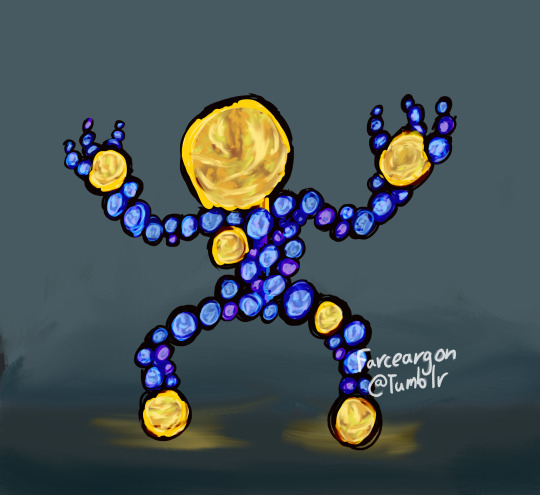
Oh yeah that's a pile of rocks alright!
This is Astares. Astares is 3ft tall and has the power to level half a city if it wanted to.
Fortunately for everyone in the Lands Between, Astares is also the epitome of a cartoon villain and shows up specifically to be an absolute nuisance, insult its victims and then try really hard to beat them up before fleeing the second it gets slightly worn down.
Why it keeps ranting about 'filthy lifeforms' and being 'a void-sent messiah' is beyond anyone's understanding. Frankly no one cares either when it keeps trying to kill them.
-
Astares serves as a little antagonist OC of mine and I love it dearly. So I wanted to finally draw it :]
#eldritch squeaking#messy machinations#elden ring#elden ring oc#BET YOU DIDNT SEE THIS COMING#elden ring oc but it's ROCKS#i have 2 actual main ocs and 3 who are part of their party. various other antagonists and meetings.#but of all of them. god i really love astares#everything everywhere in the lands between ever is just depressing and bleak and sad#i think it's much better and funnier to have an antagonist that's like elden ring's team rocket equivalent#that. that's good fun#imagine getting your all-powerful ass handed to you by what youre pretty sure is a sapient bag of marbles#in case youre wondering yes it does shout a lot. yes it does make a lot of flourishing gestures#not everything has to be doom and gloom because the og media is. fight me. i love my doofy dumbass guys
16 notes
·
View notes
Text
“They Called Us Enemy”: George Takei Recalls Interment and Its Cautionary History
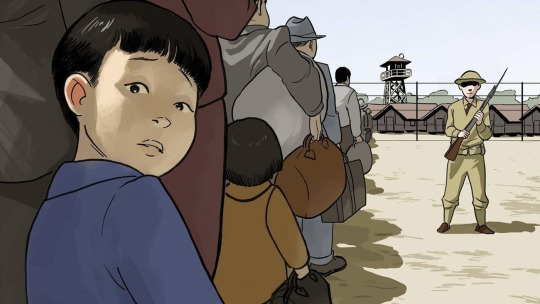
Written by George Takei, Justin Eisinger, Steven Scott
Illustrated by Harmony Becker
This past weekend I got to make my annual pilgrimage to the nerd Mecca capital of the world; San Diego Comic-Con.
It’s a fun and often exhausting experience between panel hopping to see your favorite movie or TV show actors speak and standing in line often for hours just to see them or to buy merch in the Dealer’s hall.

(At least it wasn’t hot this year.)
Every year though, somehow or another, I always meet at least one celebrity be it intentionally or accidentally. Last year I got to run into Billy West, best known for his voice acting roles on Ren &Stimpy and Futurama, the year before that it was MMA legend Josh Barnett who is a huge comic book geek and before that I met my all-time favorite TV composer Bear McCreary. This year I got to not only meet, but cross a massive name off my bucket list, in George Takei.
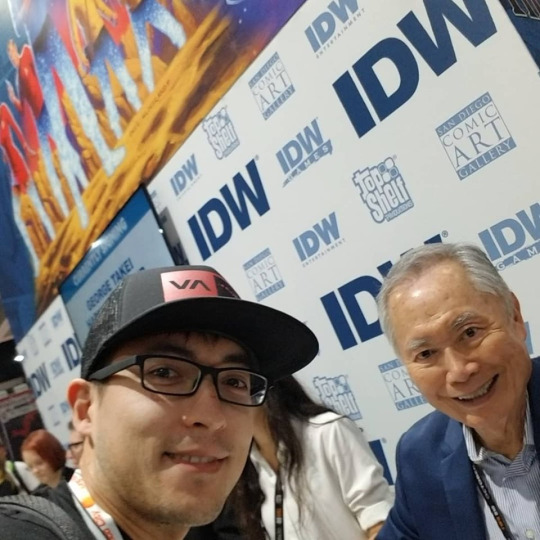
(^It me...)
Takei needs no introduction of course; the outspoken OG Star Trek alum is now firmly an internet personality of sorts and hugely popular figure amongst my generation and nerdom alike. But he wasn’t there at Comic-Con to talk about Star Trek or any number of Science Fiction related items to his acting past. No, this time he was here to promote his new graphic novel “They Called Us Enemy” based on a much darker period in his life; the infamous internment of Japanese Americans in concentration camps across the country during World War II.
Takei has never been shy about his opinions on politics and society and definitely very open about his time in those camps but this graphic novel helps not only shed a light on his own personal experience there and all the nuanced feelings that came from that but just how deplorable Executive Order 9066 was on American History.
Now, with the recreation of concentration camps this time along the southern border indefinitely imprisoning migrants seeking asylum in our country, Takei’s graphic novel reminds us all why this is so wrong and why we should not turn our backs again.
“They Called Us Enemy” is one-part history book detailing key events, people and often distressing quotes from our politicians on Japanese-American concentration camps but three-parts a visual and written history of Takei’s family journey from pre-WWII internment to the present. Through his parents, his father a first generation Japanese American, his mother second generation to how the events of Pearl Harbor unlawfully stripped them of their dignity, they try their best to make sense of the situation while keeping their children from baring the weight of this shameful period of history. What is an “extended vacation” for Takei and his siblings is a prolonged agonizing experience of doubt, humiliation and degradation for his parents and the toll it takes on his father especially is told through the panels of this graphic novel.
I think the most astounding thing about this graphic novel is that it isn’t especially bitter. It’s upsetting for sure, and bitter in parts, as Takei certainly wants his reader to feel how his family felt through this period in American history but he makes a point of showing how inevitably in all things in America, the wheels of justice may be slow but they do not stop moving forward as long as there are those willing to fight for it. How Takei’s family handles this humiliating and degrading experience is both brave and sad all at once. Takei, for his and his younger siblings, part are completely ignorant of the situation they’ve been forced into and his parents do their best to keep things as normal as possible for them through this ordeal treating it as a long “vacation” for them. They do this despite the fact they’ve been forcibly torn away from their homes, given no time to pack their things, given nametags like cattle and forced to sleep and live in conditions befitting of farm animals.
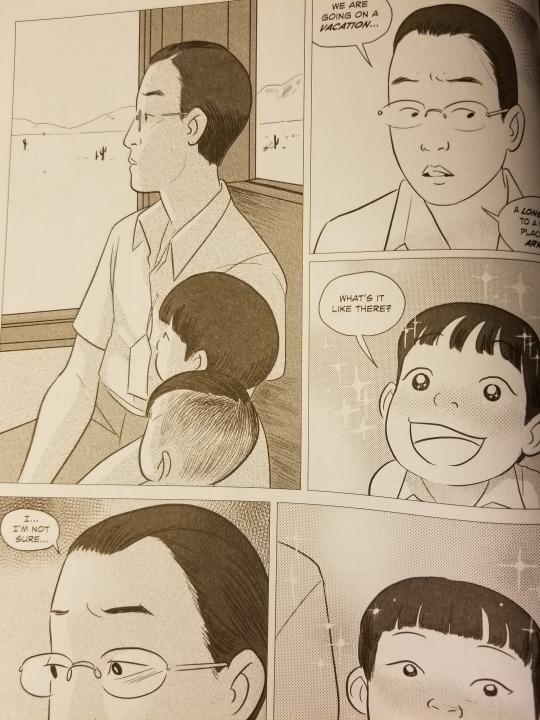
America may not have led anyone into death camps, during this period, as the Germans did with the Jews but as Takei points out it was still based on fear of a perceived “enemy” and still forced Japanese Americans into these horrid conditions and to do things that our constitution and Bill of Rights explicitly states against for its citizens.
But for Takei, as a child back then, it was an adventure of sorts for he and his siblings that was shielded by his parents to keep him from grasping the full scope of what was really going on. In this way, the graphic novel is somewhat bittersweet; sweet that George and his siblings through the tireless effort of their parents was able to enjoy some level of a childhood within the camps but bitter that as he grew older he finally understood why he was there.
Through Takei’s writings and Harmony becker’s wonderful illustrations we get a grasp of the simultaneous joy and pain that Takei associates with this period in his life; how his mom, when given little time to grab her own personal belongings when the soldiers came, grabbed only things for her children such as sweets and a sewing machine to fashion them new clothes in the camps as to keep their childhoods alive, and how his father helped organize camp leadership and helped lead these disillusioned Americans who had no idea what the future held or if there was a future there at all.

It was in these camps in fact that Takei discovered his love for acting and theater, as funny as that may sound, as camp members were able to show movies within its barb-wired fences. Takei would use this inspiration when his family returned to Los Angeles to become an actor down the line and eventually take up his famous role as Sulu in “Star Trek” and the reason largely was because of the camps. As the graphic novel states Gene Rodenberry (Star Trek’s original creator) wanted a show that envisioned a future where a diverse cast of people worked together for the benefit of all humanity and having an Asian American not only be present in this cast but be a resourceful, responsible lead was paramount. Takei understanding how taking on a role that could give Asian Americans agency in popular media wanted the part immediately as it could help show the country that people who looked like him weren’t the enemy.
Fifty plus years later and he is still advocating for that representation and need for diversity today.

(Being God damn fabulous at it too)
The graphic novel does lay out many things that most average Americans are probably not familiar with; the fact that much of these Japanese-Americans belongings were liquefied and sold off after they were taken from their homes, that many of them tried to join the fight against Japan after Pearl Harbor but were turned away because of their race, and of course after the US finally needed more troops they conscripted members of these very same camps, people they had openly vilified and wrongly detained, to enlist later to become the 442nd Battalion the most decorated group of its kind during World War II.
It’s again infuriating and uplifting all at once; as Takei points out the people who chose to enlist from the camps were as much patriots and heroes as those who chose not to and who could blame them? Many Japanese Americans saw it as an opportunity to prove they were indeed Americans and show the country that had wronged them that they were as patriotic as their white counterparts. For the others it was an act of civil disobedience showing that they didn’t need prove anything to the country that had turned their backs on them.
Takei’s family chose the latter in this regard and nearly lost everything in the process.
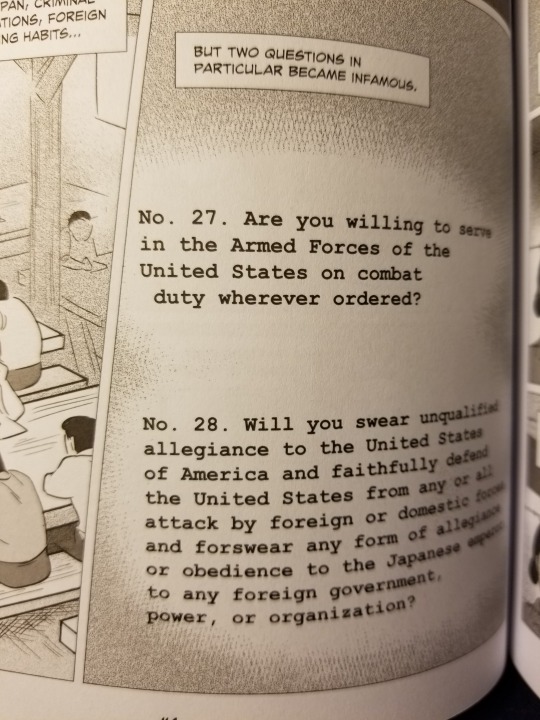
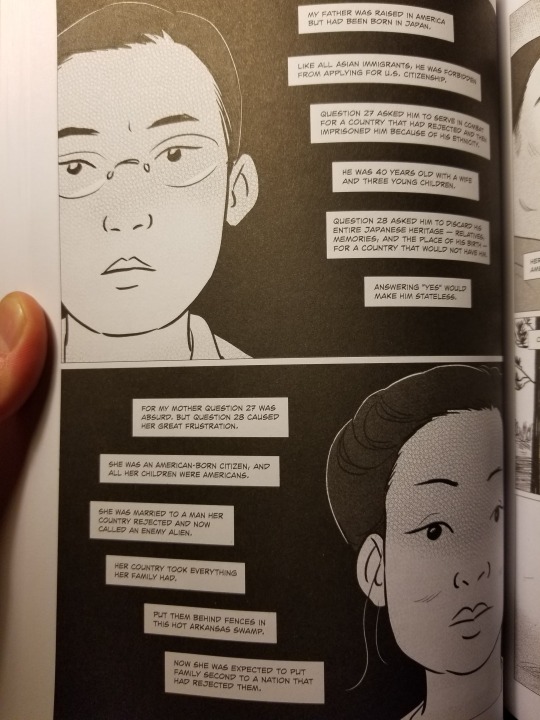
The path toward justice is often a long and degrading road for victims and the unjustly accused. For Japanese Americans during this time it took damn near half a century before reparations were made and by then many of its oldest prisoners had passed away not knowing that America had admitted their guilt.
Its sad and if reading about this part of history and seeing what’s happening now at the border doesn’t make your blood boil, I’m not sure what will.

“They Call Us Enemy” does a great job of not only informing Americans on what happened during this time period and Takei’s very personal story in between all that, but offers a stark warning about repeating the mistakes of the past as we are now at the border. We cannot keep going with this cycle of endlessly vilifying folks for simply looking the part of “the enemy” regardless of their legal status or us being at war with countries that happen to look like them.
I’m of the mind that people deserve inalienable rights regardless of citizenry. Locking up people and throwing away the key indefinitely and ripping children from the arms of their screaming mothers (Something we didn’t even do to Japanese Americans) without trial is FUCKING WRONG PERIOD and ill-befitting of country that self-labels itself as the “greatest” on Earth.
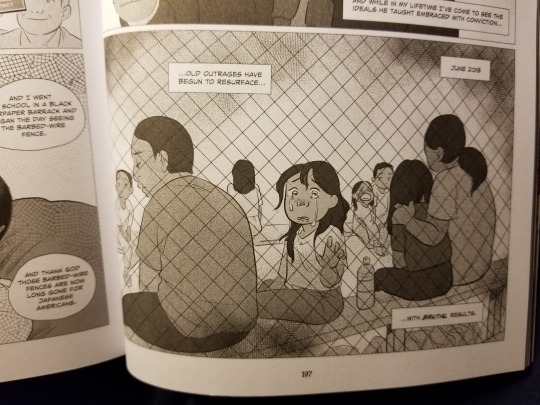
If we are to pretend we are the good guys in any of these types of conflicts we better start acting like it. FUCKING NAZIS in Nuremberg were given trials after World War II; you cannot tell me an “illegal” doesn’t deserve a chance at a hearing.
I’m often very angry and bitter about the state of the country these days and where we appear to be trending as a society but Takei’s book is not all doom in gloom when it comes to its warning on where we currently stand on justice. As the graphic novel states:

Our strength as a country is that we are capable of change, we are capable of becoming the pillars of democracy and justice that we profess to be through the valiant efforts of those who fight for it. Whether it was the Abolitionists of the Civil War period, Martin Luther King during the Civil Rights era or for these wrongly interred folks, Fred Korematsu, Yuri Kochiyama, Wayne Collins, or Daniel K. Inouye, we will always find a way to move forward as long as brave individuals come together to fight for what’s right.
We can be those brave individuals too, so long as we stand up, voice our disapproval and move the needle of our democracy. We still have all the power here to affect change. We cannot let the wrongs of the past continue on in our present, our democracy and the very fabric of decency, respect, and justice depend on it. Takei’s family and 120,000 plus Japanese Americans who suffered through this depend on us being better for the present and future.
Don’t turn your back on it. Not now, not ever.
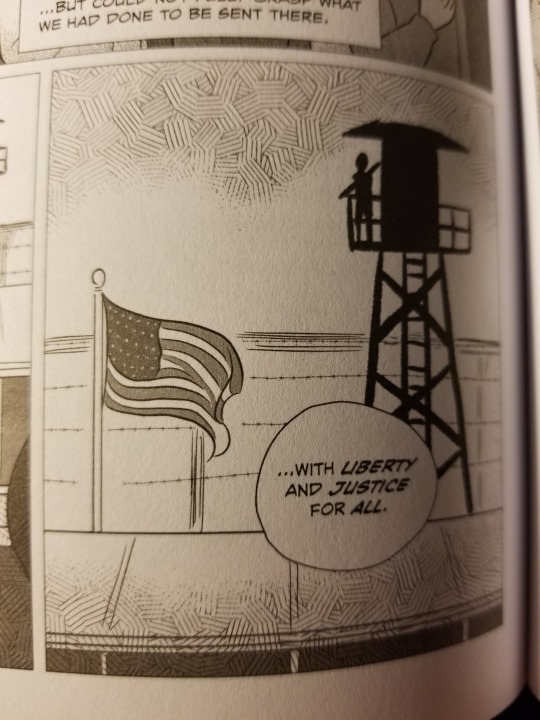
#they called us enemy#George Takei#japanese internment#internment camps#Star Trek#The Terror#Sulu#Graphic novel#comics#comic#comic books#reading#politics#border#social justice#Fred Korematsu#World War II#WWII#asian americans#asian#Americans#Japanese#Japan#Japanese American#The Farewell#crazy rich asians
599 notes
·
View notes